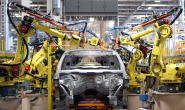Analysis

November 21, 2021
Chip Update: Shortage Improves for North American Automakers
Written by David Schollaert
The North American auto industry may have turned a corner when it comes to the widespread production outages and assembly delays caused by the shortage of semiconductor chips.
![]() As recently as mid-October, GM, Toyota, Ford, and Honda were still reporting extended widespread outages. The turn has been noticeable in one month’s time. Automakers have managed to withstand extensive parts deficits, resulting in clear improvements, additional shifts and increased production.
As recently as mid-October, GM, Toyota, Ford, and Honda were still reporting extended widespread outages. The turn has been noticeable in one month’s time. Automakers have managed to withstand extensive parts deficits, resulting in clear improvements, additional shifts and increased production.
Toyota Motor Corp. has experienced extensive downtime in the second half of the year. The automaker cut its North American production by almost 60% in August and September, followed by a cut of 60,000-80,000 in October, and another 45,000-55,000 vehicles less in November. It’s latest update, reflecting December’s cuts, remain considerable, but improved as the Japanese-carmaker continues to manage its supply chain deficits.
“Due to ongoing challenges with our supply chain, Toyota will continue to face shortages that will affect production at a few of our North American plants. Our manufacturing and supply chain teams are working diligently to minimize the impact on production. Though the situation remains fluid, in North America we are projecting a reduction of approximately 20,000-30,000 vehicles in December. We do not anticipate any impact to employment at this time.”
For Honda Motor Co.’s North American operations, the standard media response remained in effect. The carmaker said it continues to manage supply chain issues related to the global pandemic, port congestion and the microchip shortage.
The company noted that some of its North American operations have adjusted production based on parts supply during the week of Nov. 15. The Japanese automaker indicated that the situation remains fluid with further adjustments expected, however, no specific plant or model information would be provided.
Despite some ongoing woes, there was major improvement reported to SMU elsewhere.
For General Motors Co., its Ramos Assembly plant in Mexico, which had been down since Aug. 23, resumed one shift of production of the Chevrolet Blazer on Oct. 18. Production of the Blazer will remain on one shift through the week of Dec. 27. Production of its Chevy Equinox, which has been down since Aug. 16, will remain on downtime through the week of Dec. 27. Regular production, however, will be reinstated in January 2022.
“We are currently seeing a better flow of semiconductors in our supply chain, most of our North American assembly plants are now back to running regular production, and volumes are increasing in the fourth quarter,” GM told SMU. “In fact, several of our plants are running weekend overtime shifts this month, including our mid-size truck, full-size truck and full-size SUV plants.”
GM’s CAMI Assembly in Ingersoll, Ontario, resumed one shift of its Chevy Equinox assembly on Nov. 1 after being down since July 19. CAMI Assembly will remain at current production levels through the week of Dec. 27, a company spokeswoman said.
GM expects to see higher production volumes in 2022 compared to 2021. “Although the situation remains complex and very fluid, we remain confident in our team’s ability to continue finding creative solutions to minimize the impact of the semiconductor shortages,” she said.
GM’s developments were followed by even stronger advances from Ford, Stellantis, Daimler, and Nissan. All four automakers reported no planned semiconductor-related downtime to SMU. In fact, production has returned, with most plants operating with stable schedules. No near-term cuts are expected outside of planned Thanksgiving holiday breaks, with most carmakers pausing assemblies on Nov. 25 and Nov. 26.
By David Schollaert, David@SteelMarketUpdate.com






